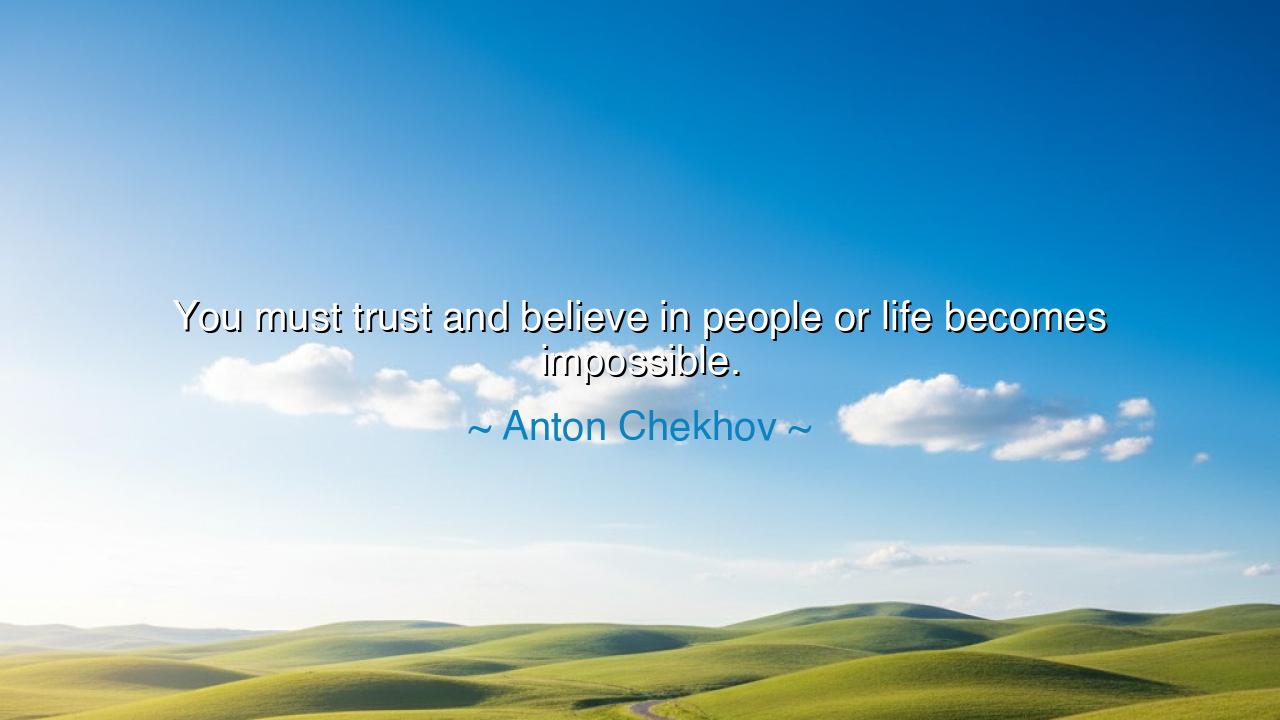
You must trust and believe in people or life becomes impossible.






In the grand tapestry of life, few truths resonate more deeply than the necessity of trust. Anton Chekhov’s words, "You must trust and believe in people or life becomes impossible," speak to the very essence of what it means to live as a human being among others. To trust is not merely an act of the mind, but a deep, often vulnerable, spiritual choice that shapes our relationships, our communities, and our very existence. Without trust in others, the world becomes a lonely, harsh place—a place where doubt reigns, and the richness of human connection fades into the background. Trust is the foundation upon which all meaningful relationships are built, and it is the thread that holds together the fragile fabric of society.
The ancients understood well the power of trust in fostering community and growth. Socrates, the father of Western philosophy, believed that knowledge itself could not be attained without trust in others. His dialogues were predicated on the belief that through dialogue and the sharing of ideas, truth could be found—not in isolation, but in relationship. For Socrates, trusting others in the exchange of thoughts and ideas was the very path to wisdom. His philosophical approach was not one of solitary reflection, but of engaging deeply with others to understand the world better. To him, trust was not just a social convenience; it was the very means by which truth was discovered and wisdom was shared.
In the more heroic narratives of ancient Greece, we see examples of trust in the bonds between men and gods, men and their comrades. Consider Achilles, the great hero of the Iliad. His bond with Patroclus was one of deep trust and loyalty. Achilles’ sorrow and rage at the death of Patroclus, whom he trusted as a brother, demonstrated the immense emotional investment that trust involves. It was not mere allegiance; it was a profound, human connection that formed the basis of his very being. Achilles’ grief over Patroclus showed the world that trust, once given, creates a bond that goes beyond friendship—it becomes the foundation of identity and purpose.
In contrast, the tragedy of Julius Caesar offers a stark reminder of the danger of misplaced trust. Caesar’s trust in his closest companions, most notably Brutus, led to his betrayal and assassination. The famous words, “Et tu, Brute?” speak to the devastating impact of broken trust—the moment when the foundation of a relationship is shattered, and the world becomes unrecognizable. For Caesar, the collapse of trust in his closest allies marked the end of his reign and the collapse of the Roman Republic. In this, we learn that trust, while powerful, must be protected and not blindly given, for the consequences of betrayal can be as dire as the loss of life itself.
However, to live without trust is to choose a life of solitude and fear. The Buddhist teachings on interdependence remind us that we are all part of a larger web of life. Our actions affect others, and their actions affect us. In the Buddhist understanding, trust is not simply about relying on others, but about understanding the interconnectedness of all things. Trust is the awareness that life, in its most meaningful form, is a shared experience. To trust others is to embrace the connectedness of our world, to act with compassion, and to give and receive freely in the dance of existence. Buddhism teaches that without trust in others, our understanding of interdependence would crumble, leaving us isolated and fragmented.
In modern times, we continue to see the critical role trust plays in shaping our personal lives and broader society. Think of the great leaders who have brought about social change and progress—Mahatma Gandhi, Martin Luther King Jr., and Nelson Mandela. All of them placed their trust in humanity, even when the world around them seemed devoid of hope. Gandhi trusted the people of India to follow his path of nonviolent resistance, while King believed in the possibility of racial equality through love and nonviolence. Mandela trusted in the possibility of reconciliation even after decades of injustice. Their ability to believe in the goodness of others, even when faced with betrayal and adversity, was not a passive act—it was a force of will that transformed nations. It was their trust in the fundamental goodness of people that led them to act with courage and vision.
Chekhov’s quote, then, carries a lesson that transcends time: trust in others is the foundation upon which we build community, purpose, and progress. To live without trust is to cut oneself off from the flow of human connection and to close oneself off from the possibility of shared growth. As Socrates and the ancients knew, wisdom and truth are best found in relationship—in the give and take of ideas, experiences, and understanding. To trust is to invite others into our lives, to risk vulnerability, and to allow ourselves to be shaped by the experiences of others. The lesson for us today is clear: we must trust in the goodness of others, even when it seems difficult, for it is through trust that we find meaning, belonging, and purpose. By placing our faith in others, we create a more harmonious world—one where we are all connected in the shared journey of life.






AAdministratorAdministrator
Welcome, honored guests. Please leave a comment, we will respond soon